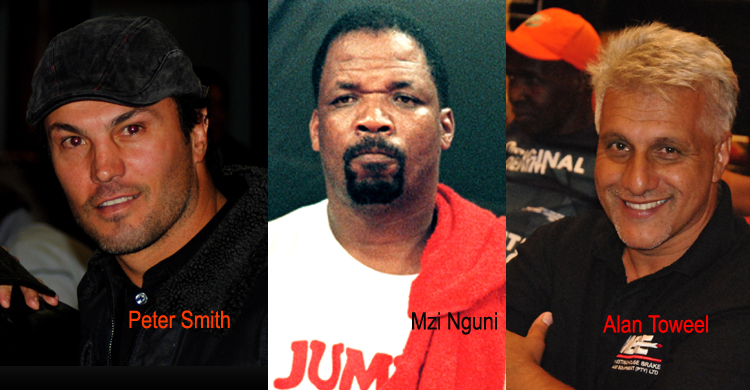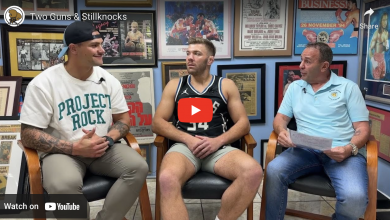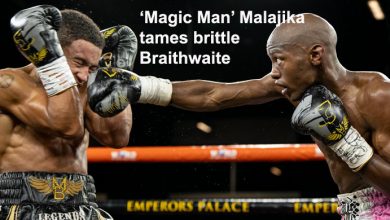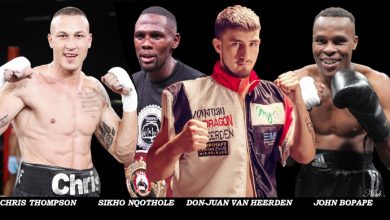Trainers: Much more than just a voice in the corner.

In recent years, with the advent of reality TV style build-ups to major fights featuring such stars as Floyd Mayweather, Manny Pacquiao, Gennady Golovkin and Canelo Alvarez, trainers have been in the spotlight more than ever before. The likes of Floyd Mayweather sr, Freddie Roach, Chepo Reynoso and Abel Sanchez have become almost as famous as their boxers.
South Africa has no shortage of familiar faces in the corner, from veterans like Harold Volbrecht, Lionel Hunter, Manny Fernandes and Alan Toweel jr, to the younger generation like Damien Durandt, the Smith brothers, Colin Nathan, Sebastiaan Rothman, Anton Gilmore and Vusi Mtolo, as well as the sages of the Eastern Cape, like Mzamo Njekanye and Ncedo Cecane.
Where do these prominent figures in the gym and in the corners come from, how did they learn their craft and what do they look for in a fighter?
The most famous family name in South African boxing with the longest history is no doubt the Toweel family, with Alan Toweel jr carrying on the legacy. It started with his grandfather, Mike, known affectionately as “Papa” Toweel and then passed to his father, Alan sr and his uncle, Willie. The family patriarch was, in fact, a fine boxer himself, even making the South African Olympic squad of 1924. When his mother did not want him to go, he turned to training boxers and coached several fighters that made the 1948 Olympic team, including his son, Vic, Johnny Arthur, Kenny La Grange and George Hunter. Arthur won bronze in the heavyweight division, while Hunter took the lightheavyweight gold, as well as the Val Barker trophy for the best fighter at the games.
From there it also extended to the professional ring with Papa Mike training his son, Vic Toweel, to become world bantamweight champion. Alan sr also became the trainer of his brother Willie and at the age of 24 was training him for his crack at the world bantamweight title against Robert Cohen in 1955, a fight that ended in a draw. “At that stage, he was the youngest trainer in the world, training someone for a world title fight,” explains Alan jr.
Once his uncle, Willie Toweel, was done fighting he also became a very good trainer in his own right, training the likes of WBA junior heavyweight champion, Piet Crous, Charlie Weir and Sugarboy Malinga for a big part of their careers, Brian Mitchell for his first 19 fights, as well as local attractions like Bruce McIntyre
“I was in the gym with my dad from the age of five,” explains Alan Toweel jr. “I learned a lot from my father but when we went overseas, we met the greats like Angelo Dundee and Eddie Futch and just by talking to those guys and listening to them we learned a hell of a lot. That’s how my father also learned. He got a lot from Ray Arcel and Cus D’Amato when he was overseas with Willie. He used to hang out at the Fifth Street Gym where he also met Charlie Goldman, who trained Rocky Marciano,” Alan jr explains the flow of knowledge. “What I also used to do with my dad, we used to watch a lot of old films of fights, almost every night. I got a lot from that too.”
Damien Durandt has a similar career trajectory having taken over the reigns from his late father, Nick Durandt, South Africa’s most prolific trainer of world champions with an incredible tally of 38, who in turn served an apprenticeship under Willie Toweel in addition to many trips overseas. “My dad spent a lot of time in the states in training camps with the likes of Lou Duva and a few others. I was in the corner of fighters since the age of 14. I think the first fight I did was Silence Mabuza for an IBF eliminator,” explains Durandt.
When talking about prolific South African trainers, one cannot help but think back to the career of Mzimasi Mnguni. Affectionately known as “Bra Mzi,” he has been struck by ill health for a long time now which forced his retirement from the corner, but in his day, Mnguni turned East London into a factory of boxing champions. There were long reigning South African champions like Jaji Sibali but as soon as South Africa was allowed back into the international sporting arena, he started producing world champions, starting with Welcome Ncita. Ncita was soon joined by Vuyani Bungu, Mbulelo Botile and Zolani Petelo.
He was also the mastermind behind two monumental upsets. There was Vuyani Bungu’s title winning decision over Kennedy McKinney, that won The Ring’s award for “Upset of the Year.” Then he also took Zolani Petelo, a complete unknown at that stage, to Thailand and upset the apple cart by knocking out long reigning champion, Ratanapol Sor Vorapin. “With Bra Mzi, there was always a plan. We didn’t just fight and hope for the best,” says Vuyani Bungu. “When I fought McKinney, we had a strategy, we stuck to the game plan and it worked.”
Just like the Toweels before him, Mnguni also undertook many overseas trips with his boxers, where he rubbed shoulders with the likes of George Benton, Lou Duva and Emanuel Steward. One of the trainers at the famous Kronk Gym, Luther Burgess, also became a fixture in Ncita’s corner. No doubt, some of that gold rubbed off on Mnguni as well.
Peter Smith had a different entrance into training. The son of former South African lightheavyweight champion and world title challenger, Kosie Smith, he was always around the sport, but his father was a fighter with no interest in training. He became a solid professional himself compiling a record of 20-2 as a heavyweight, having numerous fights in the US, before moving back home and drifting away from boxing. “I never wanted to get involved in training. It is very hard as a boxer to get involved again from a different angle. It is like looking in the mirror. Then, all of a sudden, I helped one fighter out. That was Ruben Groenewald, for his fight with Daniel Bruwer. I only had six weeks with him, but he did very well in that fight before he had an asthma attack and that basically caused him to lose the fight. A lot of people were saying that I made a positive difference so then more guys asked me to train them and it went from there.”
Smith thinks that having been a fighter gives him an advantage. “If your guy has to do twelve rounds and he is getting tired, how are going to help him if you don’t know what he is going through because you have never done it yourself?”
What is the difference between the trainers of yesterday and today?
Toweel misses the fundamentals of the sport. “The trainers of 40 years ago were more teachers. Trainers of today can shout out instructions and are good at getting their guys fit but when it comes to teaching the actual sport and molding boxers, I think that the past trainers were better.” Smith is of the opinion that it is more the sport, as a whole, that changed. “It used to be a lot tougher. I had all sorts of trouble in my career. I would have liked to be boxing today. I think I would have done better.”
What does a trainer look for when deciding whether to take a fighter on?
Alan Toweel jr looks for three things: “The first thing I look for is discipline. Then you do have to have some sort of natural ability. The third thing is the heart to fight.” Damien Durandt also emphasizes the first part. “I look for dedication. I look for commitment. If a guy shows commitment, I am willing to give him my time. Not just straight off the bat. I first want to see that they have it. It is easy to have commitment if I am going to give them all the time in the world. I want to see that commitment first before I invest my time.” “Character,” answers Smith without thinking. “I look at the kind of person they are. Honesty, integrity, respect. If you don’t have that, you can have all the talent in the world, it won’t matter. If the fighter does not believe in his trainer and his training philosophy, there is nothing the trainer can do.”
At the age of 29, Durandt has just produced his first world champion in Ilunga “Junior” Makabu. He has a big stable that includes South African flyweight champion, Jackson Chauke, junior bantamweight, Athenkosi Dumezweni, as well as junior middleweights, Brandon Thysse and undefeated banger, Emmany Kalombo.
Toweel jr, for his part, has WBA Pan African cruiserweight champion and favorite for the planned “Who will Prevail?” cruiserweight tournament, the undefeated Akani “Prime” Phuzi, as well as resurgent South African lightweight champion, Tshifiwa Munyai, junior bantamweight Sikho Nqothole and mini flyweight, Bangile Nyangani.
Big things are expected from Peter Smith’s main star, IBO cruiserweight world champion, Kevin Lerena, who is looking to get back not action against Kai Robin Havnaa in Norway and then there is also South African and IBO All-Africa super middleweight champion, Rowan Campbell, waiting in the wings.
That is a lot of talent right there!




